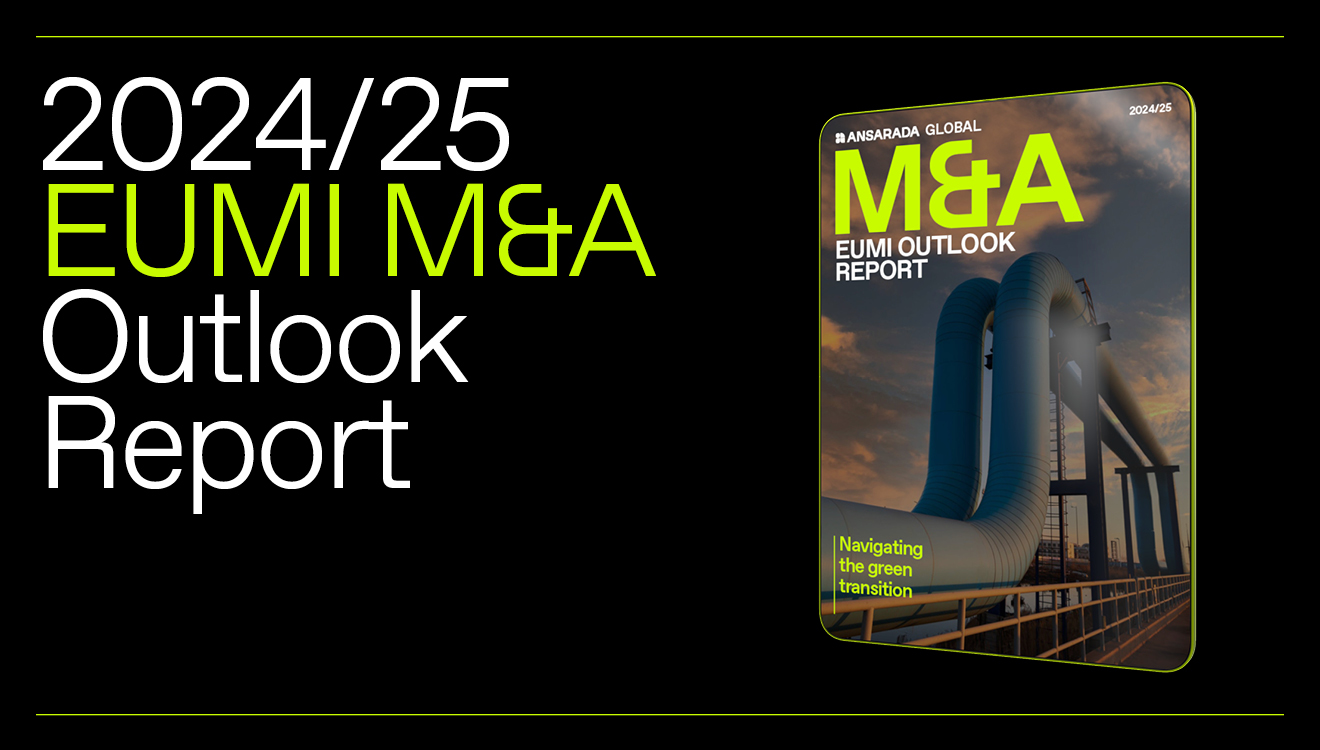EUMI M&A at a turning point amidst global uncertainty
Despite a dip in deal activity in 2024, dealmakers are optimistic about EUMI M&A
By AnsaradaWed Nov 13 2024Mergers and acquisitions, Industry news and trends, Environmental Social and Governance

The Energy, Utilities, Materials and Industrials (EUMI) sector, once battered by economic and geopolitical uncertainty, is showing signs of resilience.
Despite a dip in deal activity in early 2024, there is growing optimism amongst dealmakers like Deanna Carpenter from Hamilton Locke, Bryan Benoit and Tom Williams from Grant Thornton, and Keith Tan and Alberto Colla from MinterEllison, that the sector is on the cusp of a rebound.
Our Global M&A EUMI Outlook report details the key trends driving this shift, and what challenges may lie ahead for the industry, as identified by these dealmakers and data from the Ansarada Deal Platform.
A surge in Energy and Utilities deals
While the overall deal activity in the EUMI sector experienced a decline in the three months ending June 2024, according to data in the Ansarada Deal Platform, there’s a positive picture when we look at the broader trend. The Energy and Utilities sectors in particular, have shown a surge in activity.
Globally, Energy increased by 138% in Q2 2024 compared to Q2 2023. This significant increase in activity was seen across all regions, with triple-figure gains in Australia, the UK, and the Middle East:
- ANZ +600%
- UK&I +250%
- Europe +63%
- AMER +71%
- MEA +125%
Global Utilities M&A increased by 40% in FY24 compared to the previous financial year. The trend was driven by growth in all regions except the Middle East and Africa:
- ANZ +11%
- UK&I +12%
- Europe +33%
- AMER +3%
- MEA -29%
Driving forces for the upswing
There are several factors contributing to the resurgence in EUMI M&A, including:
Decarbonization: The global shift towards renewable energy sources is driving demand for investments in clean energy infrastructure and technologies with Environmental, Sustainability and Governance (ESG) initiatives being a major driver of deal activity.
Tom Williams, Partner and National Head of Energy and Resources at Grant Thornton, expects the energy transition will continue to underpin momentum for M&A, particularly within Utilities markets.
“Incoming ESG reporting requirements, which focus initially on the risks and opportunities organizations face in relation to climate change, are focusing attention on the energy transition at a more granular level and the use of technology in these industries to drive efficiencies and achieve sustainability objectives,” Mr Williams said.
“For management teams, these topics give rise to new work streams and costs and will continue to grow in relevance in strategy including M&A.”
Rising energy demand: The increasing adoption of AI and other data-intensive technologies is fueling a higher demand for energy. As Bryan Benoit, Principal and Global Head of Energy & Natural Resources at Grant Thornton (US) noted, “For every kilowatt-hour that we add to grids around the world through renewable energy such as wind and solar, there’s an even greater increase in demand.”
“That demand is being satisfied by traditional forms of energy – oil and gas of course, and other hydrocarbons,” Mr Benoit said.
"Some acquisitions we've been seeing are about gathering together assets that are capable of producing high profit margins even at a lower price of oil, should oil prices drop."
Adapting to economic conditions: Businesses are becoming more comfortable with economic risks and are actively seeking opportunities to grow through acquisitions.
As the economy began to recover from the impacts of the COVID-19 pandemic, and monetary policy shifted, rates began to climb as a way to push inflation back down. This cycle led to the normalization of interest rates.
“We’re dealing with geopolitical conflicts, strong inflationary pressures for the first time in years, and the normalization of interest rates at levels essentially not seen since pre-2008,” said Tom Williams.
A growing interest in gold: Gold mining and exploration companies are popular acquisition targets amid economic uncertainty. Deanna Carpenter, Partner at Hamilton Locke noted, “Geopolitical tensions over in Eastern Europe and Middle East have led some more support for the gold price, and central bank purchases – especially in emerging markets trying to move away from the US dollar, has led to an increase in demand as well.”
“There’s also been some speculation through the first half of the 2024 calendar year that there might be some interest rate cuts in order to address slowing economic growth. That’s all leading towards a really strong gold price.”
The role of government scrutiny
The emergence of these trends has coincided with a period of heightened geopolitical tensions including conflicts in Europe and the Middle East. As globalized anxiety deepens, governments will be scrutinizing cross-border investment and M&A more intensely to minimize national security risks while simultaneously shoring up and protecting their supply chains overseas.
This can already be seen in stricter foreign investment legislation and longer approval times for deals in several major economies, including Australia and the US. However, Alberto Colla, Partner at MinterEllison and Keith Tan, Special Counsel at MinterEllison, believe governments responsible for overseeing foreign investment must balance national interests with the importance of attracting foreign investment.
As a result, the pair expects approvals will still be forthcoming, albeit with two major changes:
- Companies with ties to ‘higher risk’ countries may be subject to additional conditions before their bid to acquire a foreign business is approved by that company’s government.
- The time to receive foreign investment approvals (and therefore complete a transaction) may increase.
On navigating this complexity, Mr Tan noted, “When a deal is announced, if you then have a period of months and months of navigating these regulatory approvals there’s always a risk that it just falls away.”
"As the famous saying goes, time kills all deals."
The future of EUMI M&A
Despite these challenges, dealmakers expect the pace of EUMI dealmaking to continue to accelerate, but the form these deals take will be influenced by increasingly complicated global politics. While the current macroeconomic indicators point towards a more positive year for dealmaking, there may still be clouds on the horizon.


